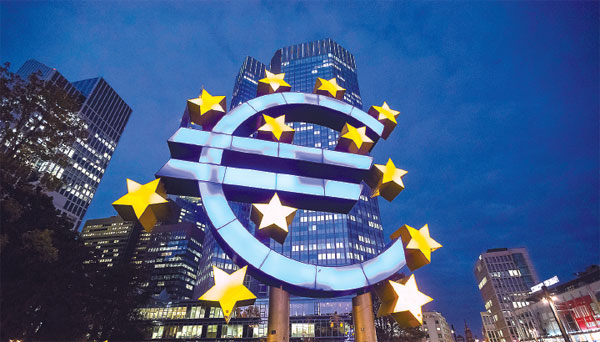Draghi weighs QE compromise
EU nations concerned over risk-sharing process as policy woes continue to mount
Mario Draghi is weighing how much a compromise on eurozone stimulus would reveal about the currency bloc's fault lines.
As the European Central Bank president and his Executive Board sit down on Tuesday to formulate a bond-buying proposal to fend off deflation, one option is to ring-fence the risks by country. While that may win over some of Draghi's opponents when the Governing Council meets on Thursday, it might also shine a spotlight on the lack of unity within the union.
|
An illuminated euro sign in front of the European Central Bank headquarters in Frankfurt, Germany. Martin Leissl / Bloomberg |
"An absence of risk-sharing could be taken as a bad signal by the market with respect to the singleness of monetary policy and could be self-defeating," said Nick Matthews, senior economist at Nomura International Plc in London. "However, it may prove to be a necessary compromise to make the design of QE more palatable for Governing Council members, and is preferable to having to limit the size of the program."
Investors are banking on Draghi to announce quantitative easing at his news conference after the council meets, with economists in a Bloomberg survey estimating the package at 550 billion euros ($640 billion). What remains unclear is how far he will go to mollify critics who say unelected central bank officials are transferring risk from weaker nations to stronger ones.
The tension surfaced again on Monday at a conference in Dublin. Irish Finance Minister Michael Noonan said having national central banks buy government bonds would be "ineffective", drawing a response from ECB Executive Board member Benoit Coeure.
Backdoor policy
"The discussion is how to design it in a way that works, in a way that makes sense," Coeure said. "If this is a discussion about how best to pool sovereign risk in Europe, and how to make the pooling of sovereign risk take a step forward in an environment where the governments themselves have decided not to do it, then this is not the right discussion."
Klaas Knot, the Dutch central bank governor, told German magazine Der Spiegel last week that "we have to avoid that decisions are taken through the back door of the ECB."
Spiegel reported on Jan 16 that the latest QE plans envisage national central banks buying the debt of their own country. Frankfurter Allgemeine Sonntagszeitung said two days later they would be liable for at least half of any losses that may arise from buying bonds issued by their own country. Neither publication said where it got the information.
Effects overshadowed
QE is supposed to boost inflation and stimulate economic growth by pushing investors into riskier assets, including outside the eurozone and so weakening the currency.
"If investors realize that the eurosystem isn't willing to shoulder the credit risk on its aggregate balance sheet, any positive displacement effects are likely to be overshadowed by increasing redenomination risks," said Elwin de Groot, senior eurozone strategist at Rabobank in Utrecht, Netherlands.
The increased probability of QE has so far been sufficient on its own to make a mark since slumping oil prices took the eurozone inflation rate below zero. The single currency is trading near an 11-year low against the dollar and fund flows out of the region probably contributed to the Swiss National Bank's shock decision last week to end a cap on the franc.



















